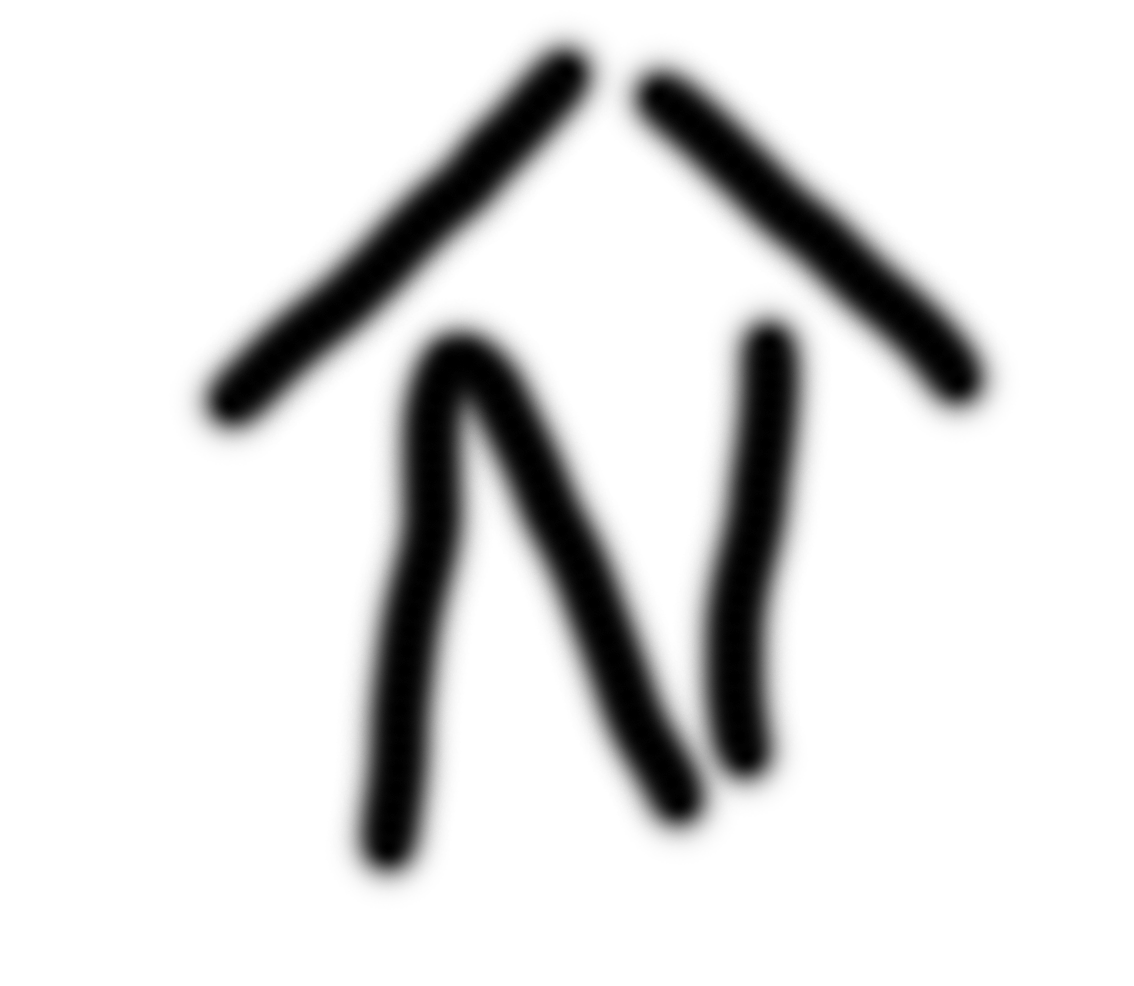


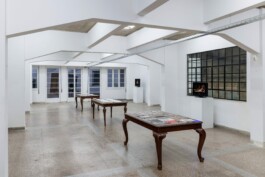
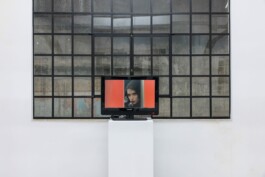
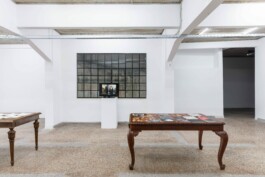
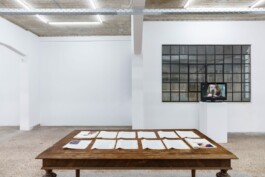
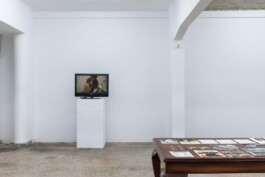
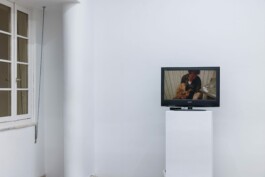
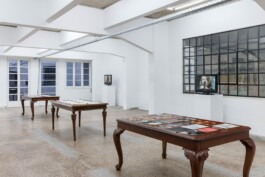
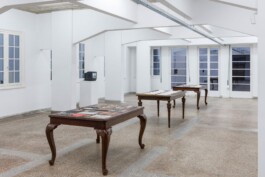
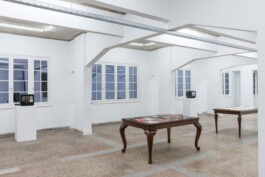
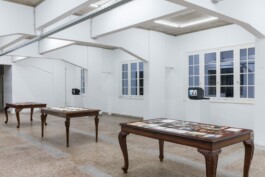
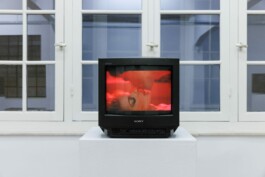
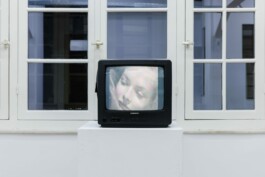
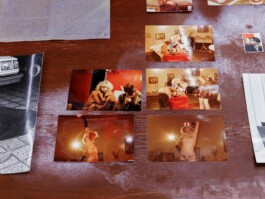



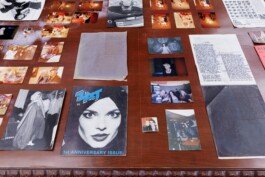
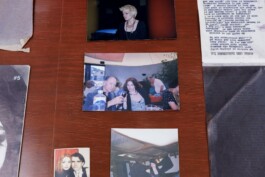
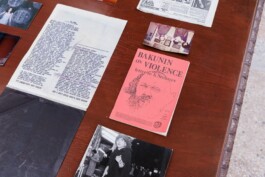
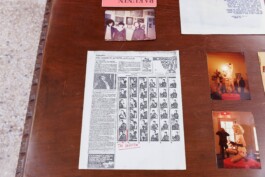
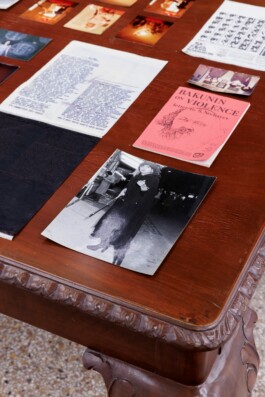
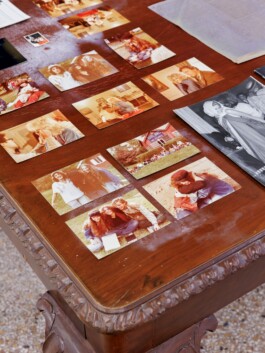
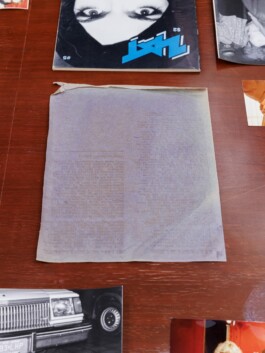
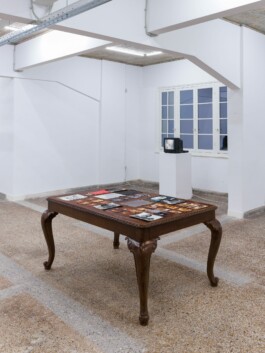
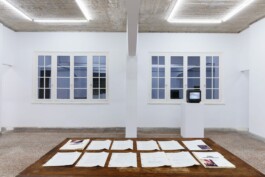
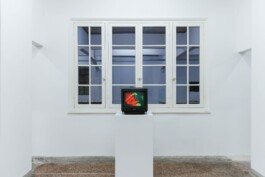
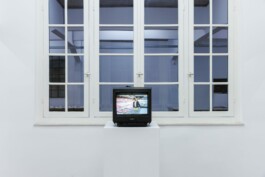
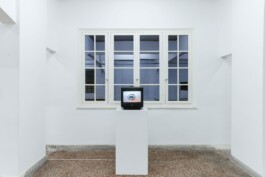
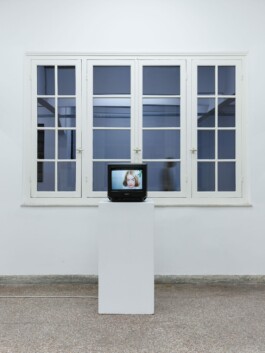
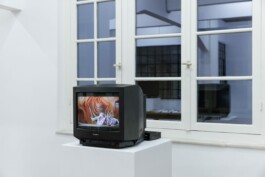
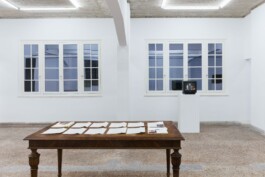
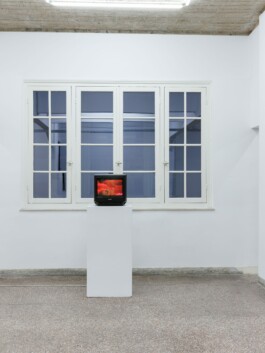
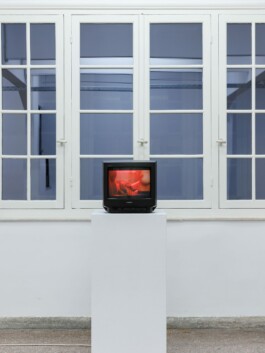
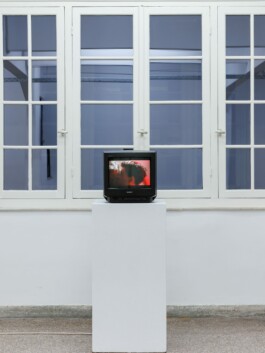
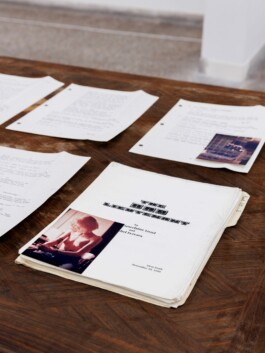
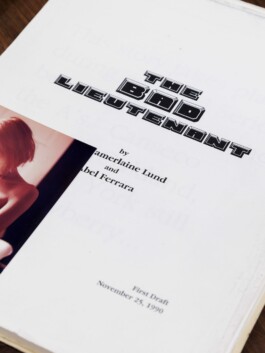
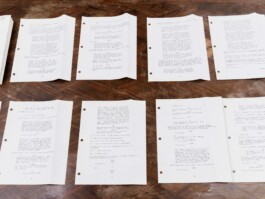
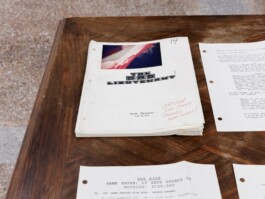
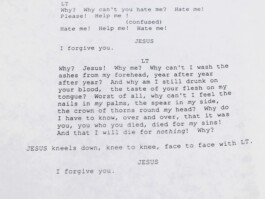
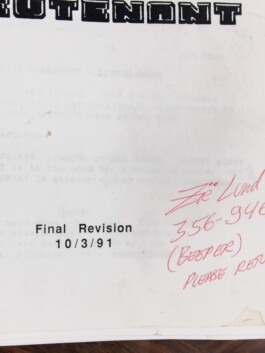
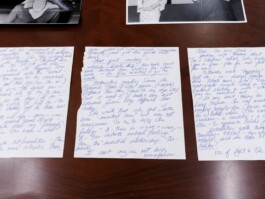
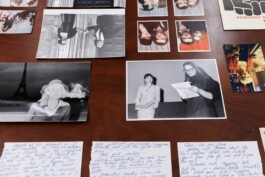
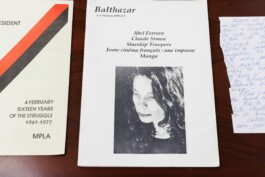
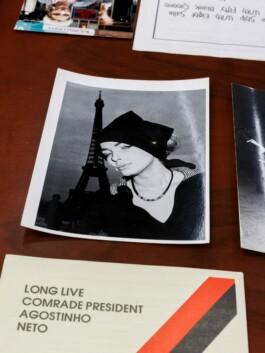
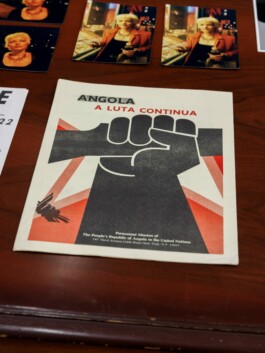
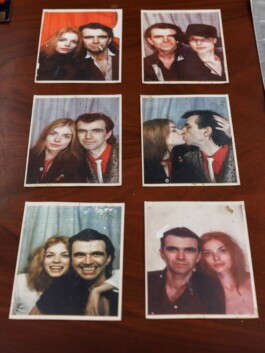
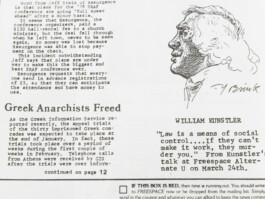
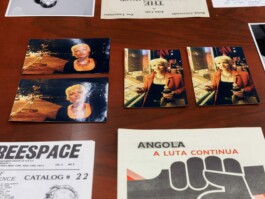
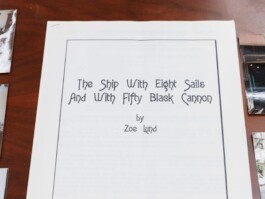
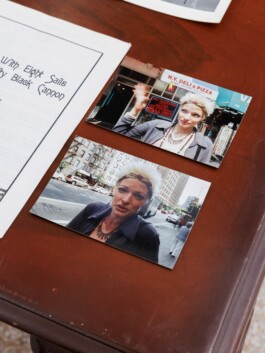
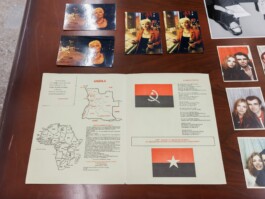
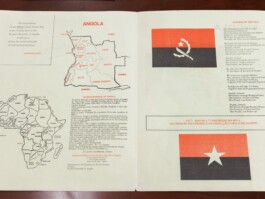
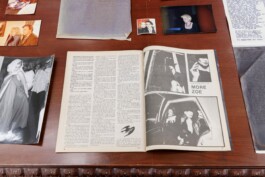
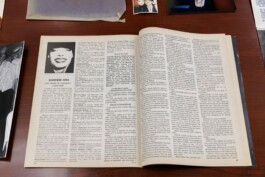
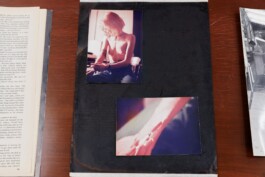
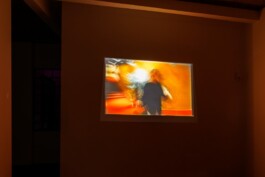
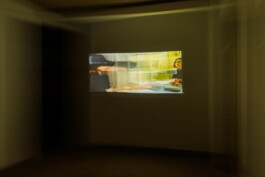
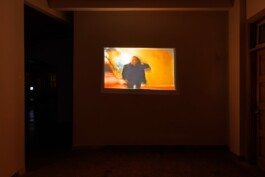
Zoë Lund, an exhibition curated by Kévin Blinderman, Pierre-Alexandre Mateos, Charles Teyssou.
23.11 – 15.01
Zoë Lund (1962 New-York, 1999 Paris) is a portrait exhibition featuring her personal relics (photographs, objects, scripts, publications, letters, poetry) and different extracts of her films which combines her various positions as an author, actress, screenwriter and director. Her filmography is dissected and reassembled on four screens to form a game of mirages and evocations. This exhibition is the culmination of a lecture given at the Fondation Pinault -Bourse de Commerce in September 2022.
This figure of the American counterculture was one of the heroines of Lower Manhattan in the 80's: shady, riddled with vacant lots and deafeningly dirty. Amidst artists, activists, junkies and misfits, she led a life suspended between offense and forgiveness, on the edge of sanctity and criminality. She had several names, several false identities, appropriated texts she would not have written, and others which would have been stolen from her. It's this bifurcated character, versatile to the extreme, a wandering soul inspired by Joan of Arc and Medea, the Rome of Petronius and the Paris of Francois Villon, that makes her irreducible, a transitional persona. In short, a supreme actress who contains and embraces all the roles at once, for the heroic taste for the beings in the making as well as to espouse the causes of all those who contemplate her.
*
That which is not yet, but ought to be, is more real than that which merely is
Her first role was in Ms .45 (also titled The Angel of Vengeance and directed in 1981 by Abel Ferrara), she played Thana, a virginal, mute character who, after being raped twice, starts killing the men she meets along her way. In this "rape and revenge"-style exploitation film - part arthouse, part grandstanding - the mute child becomes an aggressively erotic vengeful killer. Thana becomes Thanatos, goddess of destruction, fulfilling herself in a personal war of expurgation through systematic phallic slaughtering.
*
La loi du sang
While this Ms .45 has acquired a cult status, it has also transformed her into a local celebrity, a pythia of the underground condemned to play the femme fatale. Zoë Lund appears in an 80's horror film (Special Effects by Larry Cohen, 1984), in Richard Hell's videotapes or in an episode of Miami Vice. But it's her writing activity, as a prodigal but impeded screenwriter, that makes up her claimed purpose. In her poems and draft scripts, some introspective others inspired by her district Loisida, (the Lower East Side nickname given by the Puerto Rican and Latino), she captures the timeless voice of the streets, praising their solidarity and their counter-system, which she raised up as an ethic. She shares their mores and vagabonds in a dilapidated New York of grimy grandeur. She read several of her texts in the Nuyorican Poets Cafe bar founded by playwright and poet Miguel Pinero, admired Cuban homosexual icon Renaldo Arenas, took part in the happenings at Darinka in Alphabet City, and left her mark in the counterplaces where fanzines, drugs, punk and militant manifestos were exchanged. In October 2023 a selection of her poems was published by Editions Lutanie and translated in French by American writer Stephanie LaCava.
*
My God, my God, why have you forsaken me
One of her most well know literary and cinematic oeuvre was the movie Bad Lieutenant (1991, Abel Ferrara) for which she wrote the screenplay. The original scenario is annotated by her hand is at the center of the exhibition and displayed on a fake Renaissance Louis XV wood tables, lavish but lousy. In this hard boiled movie, Harvey Keitel plays a corrupt cop, a notorious pervert, a drug addict oozing toxins and a gambler up to his eyeballs in debt. He begins a descent into hell through a Babylonian New York, in the grip of his own demons, sinking into limitless physical and existential decay. His liberation comes through the encounters of three saviors: a nun raped with a crucifix, a spiritual junkie played by Zoë Lund and who pricks him as a form of extreme unction, and the apparition of Jesus as an homeless wanderer. The nun Magdalena exonerates her aggressors and teaches him forgiveness. By doing this, she accompanies him symbolically on his inevitable crucifixion. Zoë Lund's morality resonates at multiple levels in this secular Catholic thriller. Every sinner deserves forgiveness, even her adversary, even her political enemies. Saint Zoë welcomes both executioners and their victims, the humiliated and the humiliating.
Zoë Lund's only film as a director is Hot Ticket (1993). It is shown here in the adjacent velvet-covered peep-show theater. This short, siamese film (1 minute 30) is made up of two shots: one in which she exits a screening room, the other in which she walks up to a cinema cashier and gives a syringe to the clerk. Finally, we see her escaping into the street, as if there had never been any limits or thresholds, doors or passages between cinema and life. Like a monstrously Golden Age Hollywood star, she is born in the red, uterine ambience of the cinema and emerges to join a mourning reality: a little death.
*
Cinema of Transgression
Zoë Lund's career lies at the crossroads of several cinematic genres. First and foremost, her aesthetics is imbued by the Cinema of Transgression (Nick Zedd, David Wojnarowicz, Lydia Lunch among others): the abrasive, violent punk and no-wave movement that waged symbolic war on the establishment and the nascent art market of NYC in the 80’s. Her youthful passion for Marxist revolutionaries will surely lead her to cross paths with Edouard de Laurot (or Yves de Laurot). A Polish filmmaker who returned from the Second World War, who became the conflicted companion of Jonas Mekas, thinking of his camera as a political weapon and who was behind two movies before meeting Zoë (Black Liberation, 1967 and Listen America!,1968). Both Zoë and him and shares the ideal of detecting in the present what constitutes a fairer future. This vein of internationalist, de-colonial, and left cinema (Group Dziga Vertov; Chris Marker ‘s Medvedkin Group, Gillo Pontecorvo’s The Battle of Algiers) infused her films and texts with a political boldness. But for Zoë Lund, a child of the media culture, the revolution could only be triggered by popular fiction, exploitation movies, violent tales and a belief in the strength of numbers and coalition against the grain of the orthodox elitism of its forebears.
Dozens of essays, novel drafts and unrealized screenplays were born of her contradictory influences: a martyred portrait of the supermodel Gia Carangi (1960-1986); another dedicated to Jenny Diver, a genius Victorian-era pickpocket; a feminist SF film adapted from Robert Merle (Les Hommes protégées, 1974) where man disappeared from earth and replaced by woman; an update version of Brecht's Die Dreigroschenoper (The Threepenny Opera); a cyberpunk spy film inspired by a William Gibson’s short story (New Rose Hotel, finally realized by Abel Ferrara in 1998 and based on Zoë first draft); and Promethea, the story of a female revolutionary in Latin America who makes illegal radio broadcasts giving coded orders to guerillas which was inspired by an idea of De Laurot and Pasolini.
*
Testament
An inconstant, irreducible personality, always in geographical and identity transit, Zoë Lund had a unique ability to give, to surrender, while at the same time being extraordinarily fertile creatively. 24 years after her death in Paris in 1999, her aura remains intact, her mythology even more pervasive. She led her life with a "sense of immediate impulse to action (...), of surpassing oneself, of bringing one's feelings and creative aspirations into play in an incandescent atmosphere where the norms of one's individual existence obeyed different laws", to quote her beloved theorist, Gramsci. Zoé is a figure of intoxication and terror, who understood at an early age that to experience life, to sink into it, was to sink into its original depths. Her career has been hampered by a fundamentally patriarchal film milieu that has often reduced her to an eroticized vamp, an icon of the chic heroine, and dashed her hopes of becoming a director. This fragmentary exhibition is made possible by a loan from her ex-husband, Robert Lund, and by the help of writer Stephanie LaCava. It aims to present Zoë Lund as a main character, a liberated and liberating artist who cannot be reduced to the underground or B-movie supporting role to which she is sometimes confined. To speak with the words of film theoretician Nicole Brenez, she is engaged in the etymological sense, putting in gage her life, her possessions and her work. Zoe Lund, is an exhibition dedicated to this profane mystic and her courage, idealism as well as her unreasonable integrity.


























































Zoë Lund, an exhibition curated by Kévin Blinderman, Pierre-Alexandre Mateos, Charles Teyssou.
23.11 – 15.01
Zoë Lund (1962 New-York, 1999 Paris) is a portrait exhibition featuring her personal relics (photographs, objects, scripts, publications, letters, poetry) and different extracts of her films which combines her various positions as an author, actress, screenwriter and director. Her filmography is dissected and reassembled on four screens to form a game of mirages and evocations. This exhibition is the culmination of a lecture given at the Fondation Pinault -Bourse de Commerce in September 2022.
This figure of the American counterculture was one of the heroines of Lower Manhattan in the 80's: shady, riddled with vacant lots and deafeningly dirty. Amidst artists, activists, junkies and misfits, she led a life suspended between offense and forgiveness, on the edge of sanctity and criminality. She had several names, several false identities, appropriated texts she would not have written, and others which would have been stolen from her. It's this bifurcated character, versatile to the extreme, a wandering soul inspired by Joan of Arc and Medea, the Rome of Petronius and the Paris of Francois Villon, that makes her irreducible, a transitional persona. In short, a supreme actress who contains and embraces all the roles at once, for the heroic taste for the beings in the making as well as to espouse the causes of all those who contemplate her.
*
That which is not yet, but ought to be, is more real than that which merely is
Her first role was in Ms .45 (also titled The Angel of Vengeance and directed in 1981 by Abel Ferrara), she played Thana, a virginal, mute character who, after being raped twice, starts killing the men she meets along her way. In this "rape and revenge"-style exploitation film - part arthouse, part grandstanding - the mute child becomes an aggressively erotic vengeful killer. Thana becomes Thanatos, goddess of destruction, fulfilling herself in a personal war of expurgation through systematic phallic slaughtering.
*
La loi du sang
While this Ms .45 has acquired a cult status, it has also transformed her into a local celebrity, a pythia of the underground condemned to play the femme fatale. Zoë Lund appears in an 80's horror film (Special Effects by Larry Cohen, 1984), in Richard Hell's videotapes or in an episode of Miami Vice. But it's her writing activity, as a prodigal but impeded screenwriter, that makes up her claimed purpose. In her poems and draft scripts, some introspective others inspired by her district Loisida, (the Lower East Side nickname given by the Puerto Rican and Latino), she captures the timeless voice of the streets, praising their solidarity and their counter-system, which she raised up as an ethic. She shares their mores and vagabonds in a dilapidated New York of grimy grandeur. She read several of her texts in the Nuyorican Poets Cafe bar founded by playwright and poet Miguel Pinero, admired Cuban homosexual icon Renaldo Arenas, took part in the happenings at Darinka in Alphabet City, and left her mark in the counterplaces where fanzines, drugs, punk and militant manifestos were exchanged. In October 2023 a selection of her poems was published by Editions Lutanie and translated in French by American writer Stephanie LaCava.
*
My God, my God, why have you forsaken me
One of her most well know literary and cinematic oeuvre was the movie Bad Lieutenant (1991, Abel Ferrara) for which she wrote the screenplay. The original scenario is annotated by her hand is at the center of the exhibition and displayed on a fake Renaissance Louis XV wood tables, lavish but lousy. In this hard boiled movie, Harvey Keitel plays a corrupt cop, a notorious pervert, a drug addict oozing toxins and a gambler up to his eyeballs in debt. He begins a descent into hell through a Babylonian New York, in the grip of his own demons, sinking into limitless physical and existential decay. His liberation comes through the encounters of three saviors: a nun raped with a crucifix, a spiritual junkie played by Zoë Lund and who pricks him as a form of extreme unction, and the apparition of Jesus as an homeless wanderer. The nun Magdalena exonerates her aggressors and teaches him forgiveness. By doing this, she accompanies him symbolically on his inevitable crucifixion. Zoë Lund's morality resonates at multiple levels in this secular Catholic thriller. Every sinner deserves forgiveness, even her adversary, even her political enemies. Saint Zoë welcomes both executioners and their victims, the humiliated and the humiliating.
Zoë Lund's only film as a director is Hot Ticket (1993). It is shown here in the adjacent velvet-covered peep-show theater. This short, siamese film (1 minute 30) is made up of two shots: one in which she exits a screening room, the other in which she walks up to a cinema cashier and gives a syringe to the clerk. Finally, we see her escaping into the street, as if there had never been any limits or thresholds, doors or passages between cinema and life. Like a monstrously Golden Age Hollywood star, she is born in the red, uterine ambience of the cinema and emerges to join a mourning reality: a little death.
*
Cinema of Transgression
Zoë Lund's career lies at the crossroads of several cinematic genres. First and foremost, her aesthetics is imbued by the Cinema of Transgression (Nick Zedd, David Wojnarowicz, Lydia Lunch among others): the abrasive, violent punk and no-wave movement that waged symbolic war on the establishment and the nascent art market of NYC in the 80’s. Her youthful passion for Marxist revolutionaries will surely lead her to cross paths with Edouard de Laurot (or Yves de Laurot). A Polish filmmaker who returned from the Second World War, who became the conflicted companion of Jonas Mekas, thinking of his camera as a political weapon and who was behind two movies before meeting Zoë (Black Liberation, 1967 and Listen America!,1968). Both Zoë and him and shares the ideal of detecting in the present what constitutes a fairer future. This vein of internationalist, de-colonial, and left cinema (Group Dziga Vertov; Chris Marker ‘s Medvedkin Group, Gillo Pontecorvo’s The Battle of Algiers) infused her films and texts with a political boldness. But for Zoë Lund, a child of the media culture, the revolution could only be triggered by popular fiction, exploitation movies, violent tales and a belief in the strength of numbers and coalition against the grain of the orthodox elitism of its forebears.
Dozens of essays, novel drafts and unrealized screenplays were born of her contradictory influences: a martyred portrait of the supermodel Gia Carangi (1960-1986); another dedicated to Jenny Diver, a genius Victorian-era pickpocket; a feminist SF film adapted from Robert Merle (Les Hommes protégées, 1974) where man disappeared from earth and replaced by woman; an update version of Brecht's Die Dreigroschenoper (The Threepenny Opera); a cyberpunk spy film inspired by a William Gibson’s short story (New Rose Hotel, finally realized by Abel Ferrara in 1998 and based on Zoë first draft); and Promethea, the story of a female revolutionary in Latin America who makes illegal radio broadcasts giving coded orders to guerillas which was inspired by an idea of De Laurot and Pasolini.
*
Testament
An inconstant, irreducible personality, always in geographical and identity transit, Zoë Lund had a unique ability to give, to surrender, while at the same time being extraordinarily fertile creatively. 24 years after her death in Paris in 1999, her aura remains intact, her mythology even more pervasive. She led her life with a "sense of immediate impulse to action (...), of surpassing oneself, of bringing one's feelings and creative aspirations into play in an incandescent atmosphere where the norms of one's individual existence obeyed different laws", to quote her beloved theorist, Gramsci. Zoé is a figure of intoxication and terror, who understood at an early age that to experience life, to sink into it, was to sink into its original depths. Her career has been hampered by a fundamentally patriarchal film milieu that has often reduced her to an eroticized vamp, an icon of the chic heroine, and dashed her hopes of becoming a director. This fragmentary exhibition is made possible by a loan from her ex-husband, Robert Lund, and by the help of writer Stephanie LaCava. It aims to present Zoë Lund as a main character, a liberated and liberating artist who cannot be reduced to the underground or B-movie supporting role to which she is sometimes confined. To speak with the words of film theoretician Nicole Brenez, she is engaged in the etymological sense, putting in gage her life, her possessions and her work. Zoe Lund, is an exhibition dedicated to this profane mystic and her courage, idealism as well as her unreasonable integrity.
